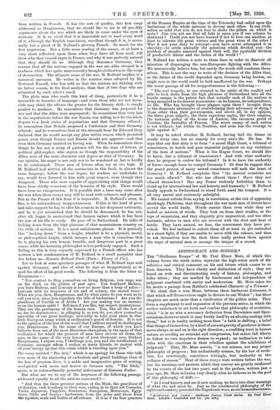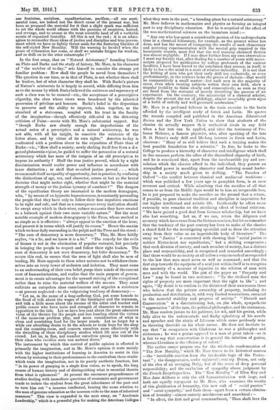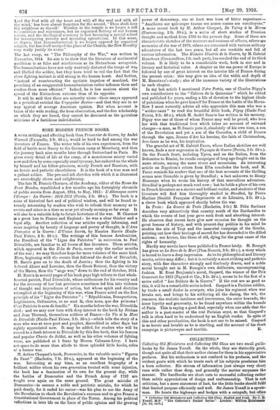ARISTOCRACY AND JUSTICE.*
THE "Shelburne Essays" of Mr. Paul Elmer More, of which this volume forms the ninth series, represent the high-water mark of the reflective and critical comment on life and letters which comes to us from America. They have clarity and distinction of style ; they are based on wide and discriminating study of history, philosophy, and belles Mitre ; they are marked by fearlessness and independence of judgment combined with sanity and moderation. Mr. More takes for his motto a passage from Halifax's celebrated Character of a Trimmer : " We think that a wise Mean, between these barbarous Extreams, is that which sell-Preservation ought to dictate to our Wishes" ; but these chapters are much more than a vindication of the golden mean. They form a supplement to and expansion of the previous series, in which the author undertook to set forth and combat that philosophy of evolution, which " is in no wise a necessary deduction from Darwinism and Spen- cerianism, however much it may fortify itself by an alluring analogy with them," but is in reality nothing more than "a faith in drifting; a belief that things of themselves, by a kind of natural gravity of goodness in them, move always on and on in the right direction ; a confiding trust in human nature as needing no restraint and compression, but rather full liberty to follow its own impulsive desires to expand ; an inclination to take sides with the emotions in their rebellion against the inhibitions of judgment." That, Mr. More asserts, " is not science, nor any proper philosophy of progress ; but undoubtedly science, by the law of evolu- tion, has unwittingly, sometimes wittingly, lent authority to this collapse of reason." Most of these essays were written before the war, but the warnings and protests which they convey are greatly reinforced by the events of the last two years, and in the preface, written just a year ago, Mr. More indicates very clearly what he believes to be the goal of this philosophy of drift :-
" As I read history and see it now making, we have two clear warnings of what the end must be. Just as the sentifnental philosophy of the eighteenth century preceded the Napoleonic wars, so our humanitarianism,
• Aristocracy and Justice : Shelburne Essays, Ninth Series. By Paul Eimer More. London : Constable and Co. Pa. nets
our feminism, socialism, equalitarianism, pacifism,—all our senti- mental isms, are indeed not the direct cause of the present war, bat have so prepared the material for it that a slight spark was sufficient to set the whole world aflame with the, passions of suspicion, hatred, and revenge, and to arouse in the moat scientific land of all a veritable mania of organized brutality. All this is not the end ; it is an admo- nition to reconsider those ideas of justice and discipline and true govern. went which we have so lightly thrust aside for the flattering liberties of the self-styled New Morality. Will the warning be heeded when the peace of exhaustion has come, or shall we mistake fatigue for wisdom, and so drift on to the utter catastrophe ? "
In the first essay, that on " Natural Aristocracy," founding himself on Plato and Burke and the study of history, Mr. More, in his character of " the watcher of to-day," sets himself to consider the strange yet familiar problem : How shall the people be saved from themselves ? The question in our time, as in that of Plato, is not whether there shall be leaders, but of what character they shall be. With Burke's picture of Nature's aristocrats he is largely in accord, while differing from him as to the means by which Burkebo!ieved the existence and supremacy of such a class was to be ensured—viz., the acceptance of a prescriptive oligarchy, the class whose views were broadened by the inherited possession of privilege and honours. Burke's belief in the disposition to preserve and the ability to improve, taken together, as the standard of a statesman, coupled with his trust in the faculty of the imagination—though effectively ridiculed in tho distorting criticism of Paine—meets with Mr. More's substantial support. But " though Burke saw clearly enough the imperfections of the actual union of a prescriptive and a natural aristocracy, he was not able, with all his insight, to conceive the existence of the latter alone, and by virtue of its own rights." America to-day is confronted with a problem closer to the exposition of Plato than of Burke—viz., "How shall a society, newly shaking itself free from a di s- wised plutocratic regime, be guided to suffer the persuasion of a natural aristocracy which has none of the insignia of an old prescription to impose its authority ? Shall the true justice prevail, which by a right discrimination would confer power and influence in accordance with inner distinction ; or shall that so-called justice prevail . . . which recommends itself as equality of opportunity, but in practice. by confusing the distinctions of age, sex, and character, comes at last to the brutal doctrine that might makes right, whether that might be the material strength of money or the jealous tyranny of numbers ?" The dangers of the equalitarian theory are incarnated in the modern demagogue, who, " by means of an hypnotic loquaciousness, is constantly persuading the people that they have only to follow their first impulsive emotions to be right and safe, and that as a consequence every institution should 1.e swept away which in their wiser, calmer moments they have created as a bulwark against their own more variable nature." But the most notable example of modern demagoguery is the Press, whose method is as simple as it is effective : " always appeal to the emotion of the hour, and present it in terms which will justify its excess." Hence the maxim which we hear daily resounding in the pulpit and the Press and the street : " The cure of democracy is more democracy." This, Mr. More boldly replies, "is a lie, and we know it is a lie." "The remedy for the evils of licence is not in the elimination of popular restraint, but precisely in bringing the people to respect and follow their right leaders. The cure of democracy is not more democracy, but better democracy." To secure this end, to ensure that the men of light shall also be men of leading, Mr. More appeals to these select natures not to withdraw them- selves into an ivory tower of seclusion and isolation. They must come to an understanding of their own belief, purge their minds of the current cant of humanitarianism, and realize that the main purpose of govern- ment is to create advantages for the upward striving of the exceptional rather than to raise the material welfare of the maraca. They must cultivate an outspoken class consciousness and organize a resistance —at present neglected—to the vulgarizing tendency of democracy:- " Let us, in the name of a long-suffering God, put some bounds to the flood of talk about the wages of the bricklayer and the trainman, and talk a little more about the income of the artist and teacher and public censor who have taste and strength of character to remain in opposition to the tide. Let us have less cant about the great educative value of the theatre for the people and less humbug about the virtues of the nauseous problem play, and more consideration of what is clean and nourishing food for the larger minds. Let us forget for a while cur absorbing desire to fit the schools to train boys for the shop and the counting-room, and concern ourselves more effectively with the dwindling of those disciplinary studies which lift mon out of the crowd. Let us, in fine, not number ourselves among the traitors to their class who invidiae metu non audeant dicere."
The instrument by which this control of public opinion is effected is primarily the imagination, and in Mr. More's opinion it rests mainly with the higher institutions of learning in America to assist in this reform by restoring to their predominance in the curriculum those studie 'which train the imagination, not in its purely asethetic function, but " in its power of grasping in a single firm vision, so to speak, the long course of human history and of distinguishing what is essential therein from what is ephemeral." At present the enormous preponderance of studies dealing with immediate questions of economics and government tends to isolate the student from the great inheritance of the past and to turn him out " a nouveau intellectual, bearing the same relation to the man of genuine education as the nouveau riche to the man of inherited manners." This view is expanded in the next essay, on " Academic Leadership," which is a powerful plea for making the American Colleges
what they were in the past, " a breeding-place for a natural aristocracy." Mr. More believes in mathematics and physics as forming an integral part in any disciplinary education. But he is sceptical of the effect of the non-mathematical sciences on the immature mind :—
" Any one who has spent a considerable portion of his undergraduate time in a chemical laboratory, for example, as the present writer has done, and has the means of comparing the results of such elementary and pottering experimentation with the mental grip required in the humanistic courses, must feel that the real training obtained therein was almost negligible. If I may draw further from my own observation I must say frankly that, after dealing for a number of years with manu- scripts prepared for publication by college professors of the various faculties, I have been forced to the conclusion that science, in itself, is likely to leave the mind in a state of relative imbecility. It is not that the writing of men who got their early drill too exclusively, or even predominantly, in the sciences lacks the graces of rhetoric—that would be comparatively a small matter—but such men in the majority of oases, even when treating subjects within their own field, show a singular inability to think clearly and consecutively, so soon as they are freed from the restraint of merely describing the process of an experiment. On the contrary, the manuscript of a classical scholar, despite the present dry-rot of philology, almost invariably gives signs of a habit of orderly and well-governed cerebration."
Mr. More is a profound believer in the tonic exercise to the brain afforded by the intelligent study of Creek and Latin. He quotes the records compiled and published in the American Educational Review and the New York Nation to show that students of the classics do actually surpass their unclassical rivals in any field when a fair test can be applied, and cites the testimony of Pro- fessor Webster, a famous physicist, who, after speaking of the late B. 0. Peirce's early drill and life-long interest in Greek and Latin, observes : " Many of us still believe that such a training makes the best possible foundation for a scientist." In fine, he looks to the College to produce a hierarchy of character and intelligence which shall in due measure perform the office of the discredited oligarchy of birth, and he is convinced that, apart from the inexhaustible joy and con- solation which the classics afford to the individual, they possess an unequalled power in moulding character and fostering sound leader- ship in a society much given to drifting. " The Paradox of Oxford "—the conflict between classical and mediaeval traditions— which was published a few years ago in pamphlet form, is at once reverent and critical. While admitting that the sacrifice of all that comes to us from the Middle Ages would be to him an irreparable loss, he is yet prepared to make the sacrifice on the ground that a return, if possible, to pure classical tradition and discipline is imperative for our higher intellectual and artistic life. Incidentally he offers some extremely wise remarks on the sterilizing effect of textual criticism. " We have gained a good deal from German scholarship, but we have also lost something. Let us, if we can, retain the diligence and accuracy which have come from the German seminar, but let us remember that the tendency of the past century has been to make of the classics a closed field for the investigating specialist and to draw the attention away from their value as an imperishable body of literature." Thu essay on " Justice " is concerned with showing that " social justice is neither Nietzsehean nor equalitarian," but a shifting compromise ; that each division of society, and each member of society, has a distinct place and responsibility, and is recognized and rewarded accordingly ; that there would be no society at all unless a voice in each of us responded to the law that men must serve as well as command; and that the first step towards the equipoise of a soul just within itself is to recognize the necessity of a measure of injustice in the relation of man with man and with the world. The gist of the paper on " Property and Law " may be found in two sentences : " To the civilized man the rights of property are more important than the right to life " ; and again, "My desire is to confirm in the dictates of their own reason those who believe that the private ownership of property, including its production and distribution, is, with very limited reservations, essential to the material stability and progress of society." " Disraeli and Conservatism" is a discriminating but, on the whole, sympathetio " appreciation " of the man, the political philosopher, and the statesman. Mr. More renders justice to his patience, his wit, and his genius, while fully alive to the rodomontade and flashy upholstery of his novels and speeches and the strain of falseness which came perilously near to throwing discredit on his whole career. He does not hesitate to say that " in comparison with Gladstone he was a philosopher and statesman ; he was a genius opposed to a man of great talent—as it is fair to say that conservatism is in general the intuition of genius, whereas liberalism is the efficiency of talent."
The earlier essays prepare one for the wholesale condemnation of "The New Morality," which Mr. More traces to its historical sources —the "inevitable reaction from the intelemble logic of the Protes- • tent" ; the disappearance, under eighteenn-century Deism, not only of the idea of an avenging Deity, but of the seasu of deep personal responsibility; and the exetation of sympathy above judgment by the French Encyclopaedists. The " New Morality " of Ellen Key and Miss Jane Addams is only the old humanitarianism writ large, and both are equally repugnant to Mr More, who examines the results
of this glorification of humanity, this new cult of social passion" and " social sympathy," and finds them—apart from a certain elimina- tion of brutality—almost entirely mischievous and anarchical :-
" In effect, the first and great commandment, Thou shalt love the
Lord thy God with all thy heart and with all thy soul and with all thy mind,' has been almost forgotten for tho second, Thou shalt love thy neighbour as thyself.' Worship in the temple is no longer a call to contrition and -repentance, but an organized flattery of our human nature, and the theological seminary is fast becoming a special school for investigating poverty and spreading agnosticism. In this sense, or degree, that humanitarianism is no longer opposed by organized religion, but has itself usurped the place of the Church, the New Morality may really justify its name."
The last essay, on " The Philosophy of the War," was written in November, 1914. Its aim is to show that the literature of sentimental pacificism is as false and mischievous as its Nietzschean antagonist. The humanitarians have not only wantonly distorted the image of war and libelled the soldier, but they have tried to veil the fact that the sheer fighting instinct is still strong in the human heart. And further, " instead of counteracting the egotiatio impulses of mankind, the preaching of an exaggerated humanitarianism rather inflames them and renders them more efficient." Indeed, he is less anxious about the spread of the Nietzschean extreme than of its opposite.
It will be said that these are minority views—these essays appeared In a periodical entitled the Unpopular Review—and that they are in no way typical of average American opinion. But when account is taken of the wide reading, the keen observation, and the fine scholarship on which they are based, they cannot be dismissed as the querulous criticisms of a fastidious individualist.
































 Previous page
Previous page